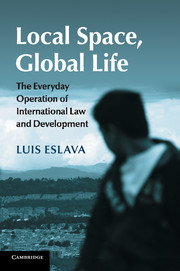Book contents
7 - Conclusions
Published online by Cambridge University Press: 05 August 2015
Summary
Over the past decades, local jurisdictions have become the preferred spaces in which to promote global ideals of democracy, peace, and human, economic and environmental development. In this book I have interrogated the dynamics and some of the tensions involved in this emergence of localities as the new centre of the global order. I have used the process of decentralization of development efforts that has been occurring across the Third World as the basis for my discussion, paying particular attention to the way in which this process has unfolded in Colombia and influenced the development of its capital city, Bogotá.
In Bogotá, the shift towards the local has facilitated a significant urban transformation while altering the city's approach to its illegal neighbourhoods. In this book, I have argued that Bogotá's changing relationship with its illegal neighbourhoods exemplifies some of the spatial and subjective implications of the arrival of the development project at the door of local jurisdictions. Through an ethnographic examination of this process, I have described the ways in which international law and the development project are implicated in the promotion of the idea that localities are the new space in which the alleged failures of Third World nation-states can at last be overcome. I have argued that international law, especially when approached from the angle of its close entanglement with the development project, is not a normative inter-national – or supra-national – system secluded from national and local administrations and from the daily lives of people. On the contrary, the international attention that is currently being paid to local jurisdictions bears witness to the enmeshment of international law in national and local transformations, and in the material and subjective construction of the world.
In this final chapter, I summarize the key arguments advanced in this book. I first outline the most important consequences of the current international attention to local jurisdictions. Next, I articulate what I perceive to be the methodological innovation of this work: the application of the ethnographic method to the interrogation of international law and the development project beyond their traditional normative, administrative, spatial and human confines. Finally, I suggest some possible future lines of inquiry arising out of the substantive and methodological findings that I have presented here.
- Type
- Chapter
- Information
- Local Space, Global LifeThe Everyday Operation of International Law and Development, pp. 293 - 305Publisher: Cambridge University PressPrint publication year: 2015



